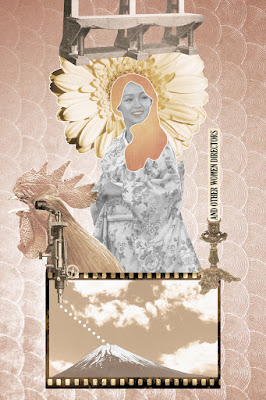☼☼☼☼☼☼☼☼☼ out of 10☼
In the initial vignette of the master Ruiz's posthumously released film, a middle-aged man flirts with his brother's wife, comparing the touching of her body to travelling across Chile, moments before handing over his own muscles (!) to her. "I thought they were like nerves." - she remarks gleefully, squeezing the pieces of raw meat between her fingers. Until that scene, the fourth wall is already broken (The people are watching us), the co-relation between divorce and leftist politics discussed, with reality dissolved and re-assembled as a wry parody of a soap opera, all in a matter of minutes!
Although it addresses post-Pinochet Chile to which Raúl Ruiz returned after years in exile (not to mention it was shot almost three decades ago), The Wandering Soap Opera feels pretty modern, relevant and universal, its timelessness stemming from the singular way it captures the bitterly ludicrous absurdity of any given country in transition, at any given point in history. One delirious dream after another, we are treated to refined, Bunuelean surrealism, humor so dry and irrational it makes Monty Python appear sensible, and the linguistically befuddling barrages of dialogue that shake you back and forth, then suddenly turn right to leave you left in a dimly lit corner of the disorienting world that out-Lynches Lynch in his Twin Peaks element or rather, out-Maddins Maddin's 'story within story ad infinitum' game of The Forbidden Room.

Telenovela tropes, from over-the-top performances to loosely defined rules regarding life and death, are borrowed solely to be wittily and mercilessly subverted into a puzzling and somewhat mildly frustrating narrative of Borgesian paradoxes lifted to another level. The TV-inside-TV existence of the characters lost in-between their own and others' soaps (with actors playing actors playing their roles or something along these lines) becomes increasingly phantasmagoric, not ceasing even when the director is 'resurrected' for the behind-the-scenes epilogue to announce: "Okay, the film's finished."
Adding to the deconstructive 'fantasy' are both the deliberately slushy, yet unobtrusive score and grainy 16mm visuals that brilliantly mimic the cheapness of endless TV dramas and, simultaneously, come laced with unmistakably Ruizian flourishes of playful shadows, deceptive mirrors and peculiar camera angles. The weird cinema enthusiasts will also find much to appreciate in little, not-to-be-spoiled details which trigger an avalanche or two of delightful WTFery.



































